Forty Hadiths On Leadership And Governance by Yahya M. A. Ondigo
Forty Hadiths On Leadership And Governance by Yahya M. A. Ondigo
Publisher:
IIPH (International Islamic Publishing House)
Author:
Yahya M. A. Ondigo
Language:
English
Binding:
Hard Cover
Pages: 424
Size: 14x21cm
Couldn't load pickup availability
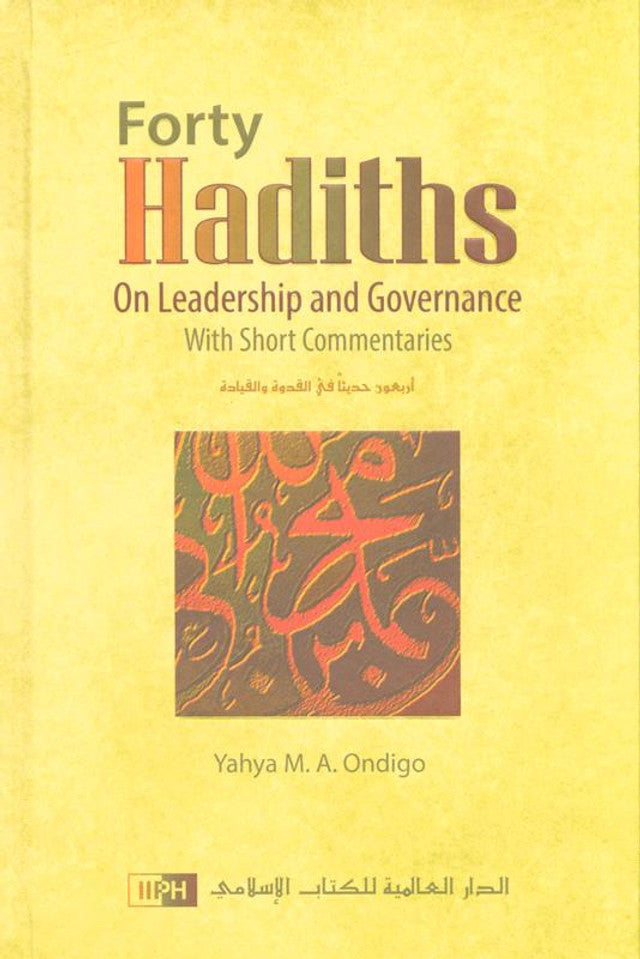
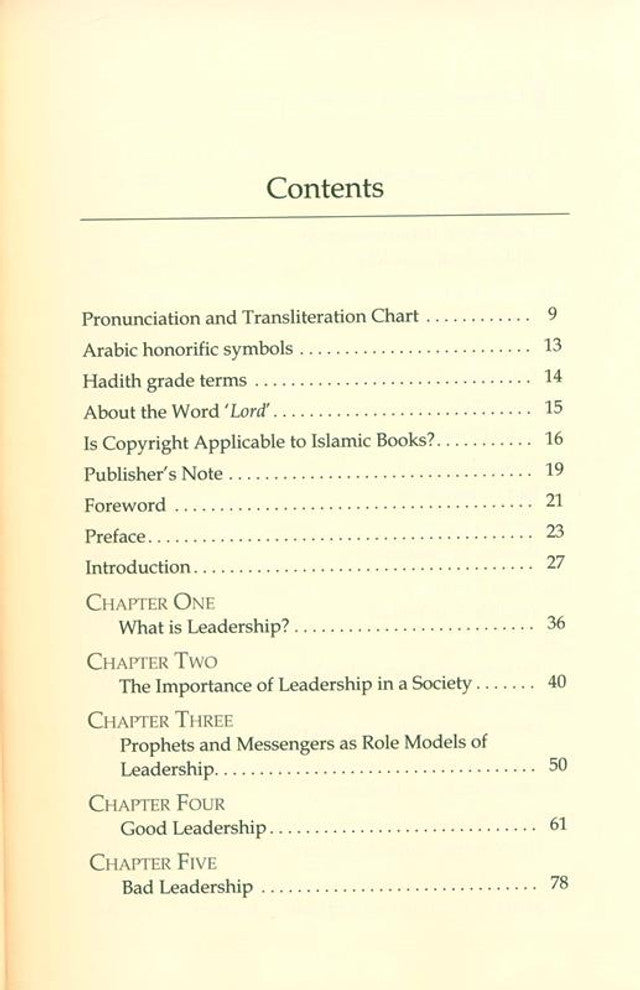
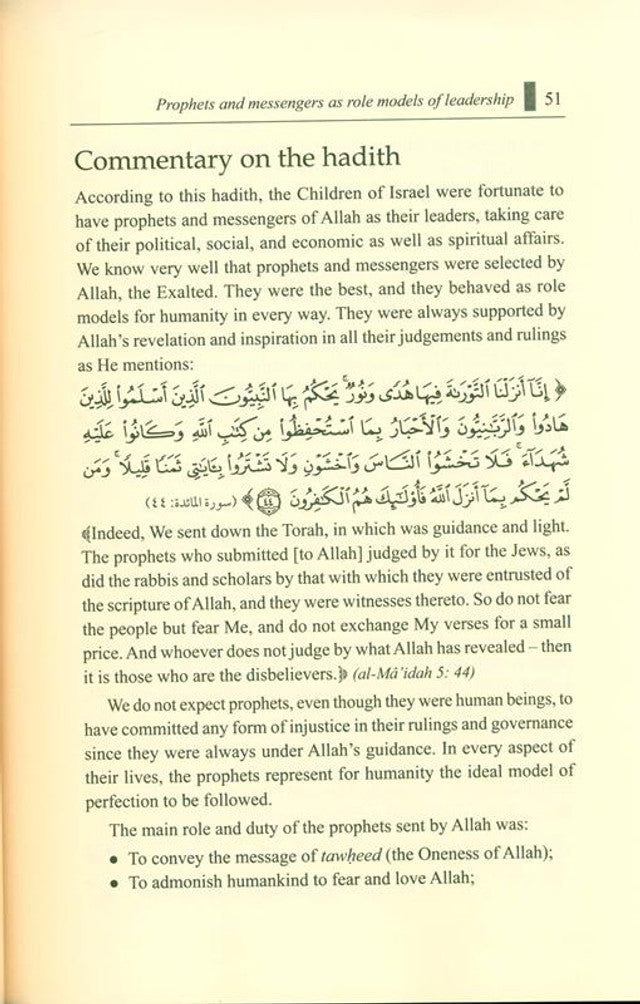
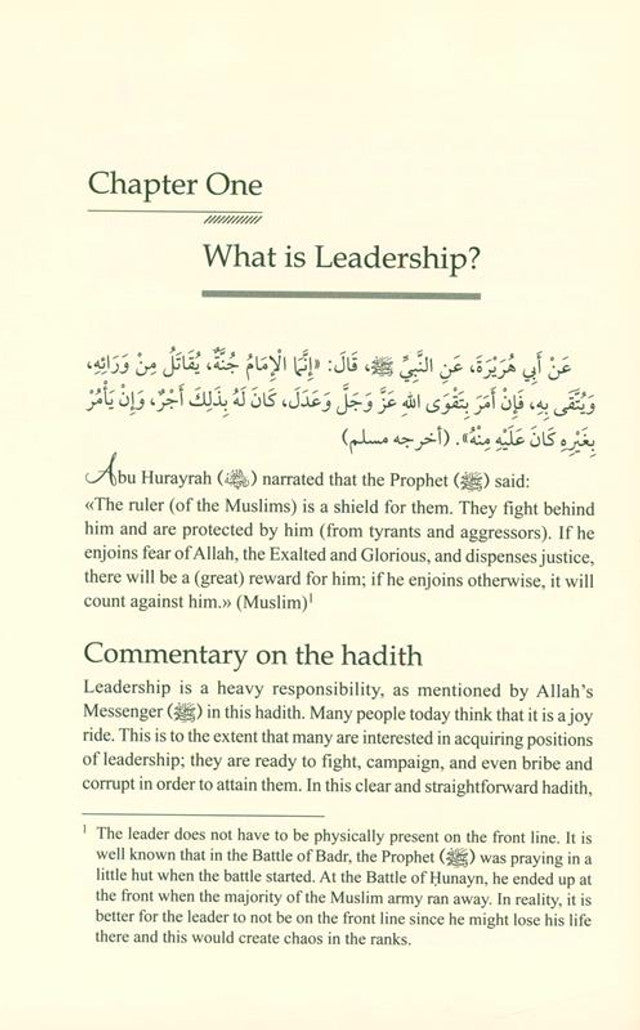
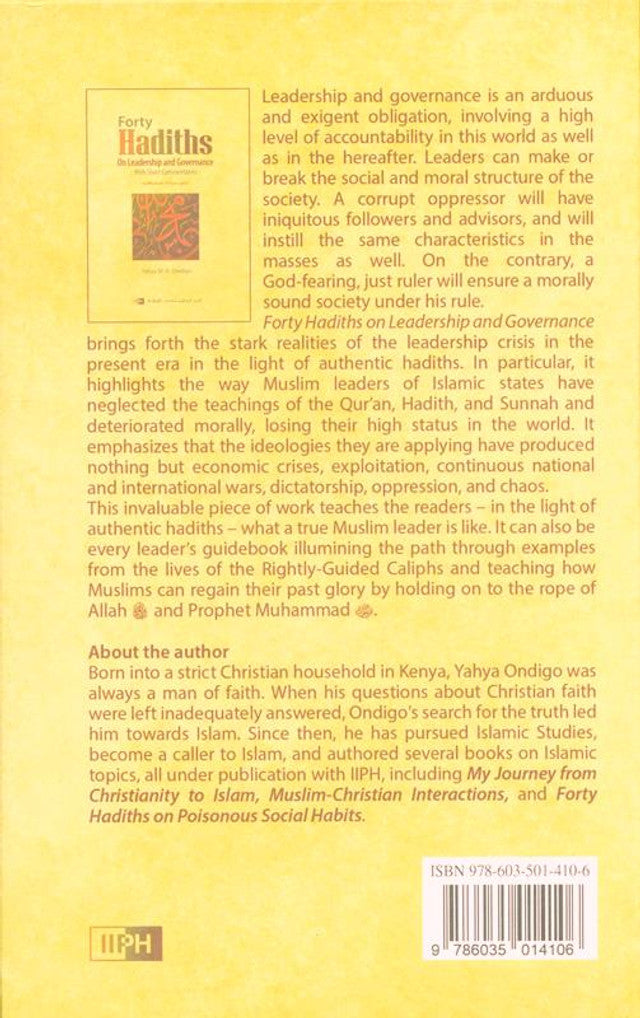
Collapsible content
Description of Book
Forty Hadiths On Leadership And Governance by Yahya M. A. Ondigo
Leadership and governance are among the most demanding and accountable roles, with significant consequences both in this world and the hereafter. A leader’s actions shape the moral and social fabric of society, and whether they guide with integrity or corruption determines the course of their followers. A corrupt leader breeds injustice and immorality, while a just and God-fearing ruler fosters a righteous and thriving society.
Forty Hadiths on Leadership and Governance explores the contemporary leadership crisis through the lens of authentic hadiths. It critically examines how modern Muslim leaders have strayed from the teachings of the Qur’an, Hadith, and Sunnah, resulting in moral decay and the loss of their rightful status in the world. The ideologies they have adopted have led to economic hardships, exploitation, perpetual wars, dictatorship, and societal chaos.This profound work offers readers a clear understanding of what true Muslim leadership looks like, drawing lessons from the lives of the Rightly-Guided Caliphs. It serves as a guide for current and aspiring leaders, providing timeless principles for regaining lost glory by adhering to the guidance of Allah and Prophet Muhammad (peace be upon him).
Publisher
IIPH (International Islamic Publishing House)
Author
- Yahya M. A. Ondigo
Sample Pages - Content
Page:01
Forty
Hadiths
On Leadership and Governance
With Short Commentaries
أربعون حديثا في القدوة والقيادة
Yahya M. A. Ondigo
الدار العالمية للكتاب الإسلامي IPH
Page:02
Contents
Pronunciation and Transliteration Chart
Arabic honorific symbols
Hadith grade terms
About the Word 'Lord'.
Is Copyright Applicable to Islamic Books?.
Publisher's Note.
Foreword
Preface..
Introduction.
13
14
15
16
19
21
23
27
2 3 4 5 2 2 2 2 5
CHAPTER ONE
What is Leadership?.
CHAPTER TWO
36
The Importance of Leadership in a Society....... 40
CHAPTER THREE
Prophets and Messengers as Role Models of Leadership..
CHAPTER FOUR
Good Leadership..
CHAPTER FIVE
Bad Leadership
50
50
61
78
Page:03
Prophets and messengers as role models of leadership
Commentary on the hadith
51
According to this hadith, the Children of Israel were fortunate to have prophets and messengers of Allah as their leaders, taking care of their political, social, and economic as well as spiritual affairs. We know very well that prophets and messengers were selected by Allah, the Exalted. They were the best, and they behaved as role models for humanity in every way. They were always supported by Allah's revelation and inspiration in all their judgements and rulings as He mentions:
إِنَّا أَنزَلْنَا التَّوْرَنَةَ فِيهَا هُدًى وَنُورٌ يَحْكُمُ بِهَا النَّبِيُّونَ الَّذِينَ أَسْلَمُوا لِلَّذِينَ هَادُوا وَالرَّبَّنتُونَ وَالْأَحْبَارُ بِمَا اسْتُحْفِظُوا مِن كِتَبِ اللَّهِ وَكَانُوا عَلَيْهِ شُهَدَاءَ فَلَا تَحْشَوُا النَّاسَ وَاخْشَوْنِ وَلَا تَشْتَرُوا بِنَايَتِي ثَمَنًا قَلِيلًا وَمَن
لَّمْ يَحْكُم بِمَا أَنزَلَ اللَّهُ فَأُوْلَبِكَ هُمُ الْكَفِرُونَ ) (سورة المائدة: ٤٤)
Indeed, We sent down the Torah, in which was guidance and light. The prophets who submitted [to Allah] judged by it for the Jews, as did the rabbis and scholars by that with which they were entrusted of the scripture of Allah, and they were witnesses thereto. So do not fear the people but fear Me, and do not exchange My verses for a small price. And whoever does not judge by what Allah has revealed - then it is those who are the disbelievers.) (al-Ma'idah 5: 44)
We do not expect prophets, even though they were human beings, to have committed any form of injustice in their rulings and governance since they were always under Allah's guidance. In every aspect of their lives, the prophets represent for humanity the ideal model of perfection to be followed.
The main role and duty of the prophets sent by Allah was:
To convey the message of tawheed (the Oneness of Al
Page:04
Chapter One
What is Leadership?
عَنْ أَبِي هُرَيْرَةَ، عَنِ النَّبِيِّ ، قَالَ: «إِنَّمَا الْإِمَامُ جُنَّةٌ، يُقَاتَلُ مِنْ وَرَائِهِ، وَيُتَّقَى بِهِ، فَإِنْ أَمَرَ بِتَقْوَى اللَّهِ عَزَّ وَجَلَّ وَعَدَلَ، كَانَ لَهُ بِذَلِكَ أَجْرٌ، وَإِنْ يَأْمُرُ
بِغَيْرِهِ كَانَ عَلَيْهِ مِنْهُ». (أخرجه مسلم)
Abu Hurayrah (4) narrated that the Prophet () said:
«The ruler (of the Muslims) is a shield for them. They fight behind him and are protected by him (from tyrants and aggressors). If he enjoins fear of Allah, the Exalted and Glorious, and dispenses justice, there will be a (great) reward for him; if he enjoins otherwise, it will count against him.>> (Muslim)'
Commentary on the hadith
Leadership is a heavy responsibility, as mentioned by Allah's Messenger () in this hadith. Many people today think that it is a joy ride. This is to the extent that many are interested in acquiring positions of leadership; they are ready to fight, campaign, and even bribe and corrupt in order to attain them. In this clear and straightforward hadith,
The leader does not have to be physically present on the front line. It is well known that in the Battle of Badr, the Prophet () was praying in a little hut when the battle started. At the Battle of Hunayn, he ended up at the front when the majority of the Muslim army ran away. In reality, it is better for the leader to not be on the front line since he might lose his life there and this would create chaos in the ranks.
Page:05
Forty
Hadiths
On Leadership and Governance
Leadership and governance is an arduous and exigent obligation, involving a high level of accountability in this world as well as in the hereafter. Leaders can make or break the social and moral structure of the society. A corrupt oppressor will have iniquitous followers and advisors, and will instill the same characteristics in the masses as well. On the contrary, a God-fearing, just ruler will ensure a morally sound society under his rule.
Forty Hadiths on Leadership and Governance brings forth the stark realities of the leadership crisis in the present era in the light of authentic hadiths. In particular, it highlights the way Muslim leaders of Islamic states have neglected the teachings of the Qur'an, Hadith, and Sunnah and deteriorated morally, losing their high status in the world. It emphasizes that the ideologies they are applying have produced nothing but economic crises, exploitation, continuous national and international wars, dictatorship, oppression, and chaos. This invaluable piece of work teaches the readers - in the light of authentic hadiths- what a true Muslim leader is like. It can also be every leader's guidebook illumining the path through examples from the lives of the Rightly-Guided Caliphs and teaching how Muslims can regain their past glory by holding on to the rope of Allah and Prophet Muhammad.
About the author
Born into a strict Christian household in Kenya, Yahya Ondigo was always a man of faith. When his questions about Christian faith were left inadequately answered, Ondigo's search for the truth led him towards Islam. Since then, he has pursued Islamic Studies, become a caller to Islam, and authored several books on Islamic topics, all under publication with IIPH, including My Journey from Christianity to Islam, Muslim-Christian Interactions, and Forty Hadiths on Poisonous Social Habits.
IIPH
ISBN 978-603-501-410-6
9 786035 014106
Yahya m. A. Ondigo
Yahya M. A. Ondigo is a distinguished academic and researcher, known for his work in various fields including Islamic studies, education, and social issues. He has contributed extensively to the discourse surrounding leadership, governance, and social justice from an Islamic perspective. Ondigo is also recognized for his thought leadership on the importance of integrating faith and modernity, focusing on the impact of ethical and moral values on contemporary issues.





